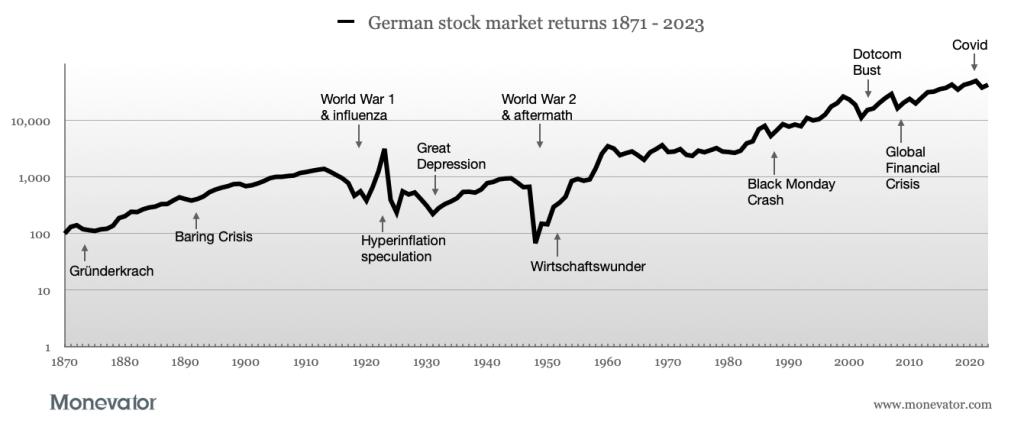
A popular daydream for anyone with access to a compound interest calculator is working out how much interest you’d earn on a million pounds. But how do you make a million pounds in the first place?
You could marry a millionaire, but if you’re the sort of person looking to do that then you’re too busy at the gym or on the ski slopes to read Monevator.
You could win the lottery. Good luck! Mathematically it’s illogical to even try, but £2 a week won’t hurt. Or you could buy a few Premium Bonds.
You could start a business, but beware that’s very risky. (On that score, don’t blog to get rich. You’ll starve).
Some people make by developing property. However once you get beyond owning your own home this is really another form of business.
That leaves saving your surplus income and investing it to make your million.
How realistic is it to become a millionaire this way?
Make a million pounds by saving and investing
Saving and investing your way to a million pounds may seem a daunting task.
For most of us, it is. But it is far from impossible.
How you make your million by investing depends on three factors:
The amount you save every month
The rate of growth of your investments
The length of time your money has to grow
Let’s ignore another factor here, which is tax and pensions. If you’re a taxpayer, the Government gives you tax breaks which effectively increase the size of your monthly savings without you having to save any more money. You’ll reach a million quicker, all things equal. But the downside is your money is locked away in a pension. You’ll be taxed on the income when you withdraw it, too.
Everyone’s tax situation is different, so in articles like this it’s best to ignore tax. But you shouldn’t when doing your own sums!
What will you earn on your portfolio?
The rate of growth in your investments (also known as the return) will depend on where you put your money – and how lucky you are!
There are no guarantees and much swearing and death threats discussion about what is likely. But just to give you a ballpark idea of long-term expected returns:
Cash and government bonds could earn 2-4% a year
Corporate bonds could early 4-6% a year
Commercial property might earn 6-8% a year
Equities (shares) could earn 8-10% a year
Riskier equities like small caps or emerging markets might hit 10-12% or more
These returns are inclusive of inflation, which will reduce the spending power of your money over time.
The important point is cash is the least-risky asset, but it offers the lowest prospective returns. Each successive asset is riskier but a better bet for the long-term.
Put your money into small cap stocks for example and you’ll have to stomach some daunting volatility along the way. However you might be more likely to get to a million before you get a bus pass.
Can you beat these returns by share trading? If you’re an amazing share picker or Warren Buffett you might make as much as 15-20% a year. But very, very few people can do that for long. If you’re one of them, you’ll probably already know it.
Note that most people generally invest in a range of assets for portfolio diversification purposes. This reduces the volatility, but it can be expected to reduce overall returns, too.
It’s also worth knowing that the longer you hold your assets, the more likely you’ll enjoy their average historical return.
Share prices, for instance, jump around all over the place in the short-term.
But as your holding period increases from months to years to decades, your returns tend towards the average.
How much must you save a month to make a million?
The following table tells you how much you need to save every month to make a million within different time periods, and with different rates of growth.
Cross-reference the growth rate in the top row with the length of time you can endure it until you’ve got your million pounds.
Where time and growth intersects is the monthly amount you’ll need to save:
4%
6%
8%
10%
12%
15%
5 years
£15,061
£14,322
£13,621
£12,958
£12,330
£11,449
10 years
£6,795
£6,125
£5,516
£4,964
£4,464
£3,802
20 years
£2,739
£2,195
£1,746
£1,381
£1,087
£754
30 years
£1,455
£1,021
£705
£481
£325
£178
What about inflation? I’ve ignored it here, because this article is about making a million pounds in nominal terms. In reality a million pounds will buy far less in 20 or 30 years. A shortcut is to read the column to the left of your expected returns. So if you expect to make 8% a year, read the column for 6%. This allows a couple of percent for inflation.
Have a play around with different rates, time periods and monthly savings amounts using our calculator.
A million pounds is certainly not what it used to be. However you’ll soon discover it is still very hard for the average person to make a million pounds quickly through investing.
A million pounds is also an arbitrary number. You’re better off working out your own sustainable plan to reach your financial goals – one that you can stick with for the long haul!
Try our millionaire calculator or see the interest on a million pounds.
The post Investing for beginners: How to make one million pounds appeared first on Monevator.



